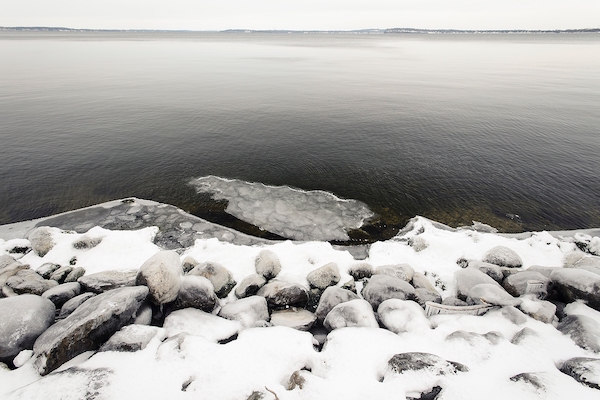news
![]()
January 13, 2017
Climate change is happening in Wisconsin, and we need solutions

 One of the most studied lakes in the world is Lake Mendota, the largest in the Yahara lake chain. Since the 1850s, scientists have been collecting data on what happens in the lake and how it is changing.
One of the most studied lakes in the world is Lake Mendota, the largest in the Yahara lake chain. Since the 1850s, scientists have been collecting data on what happens in the lake and how it is changing.
These data provide evidence that Wisconsin’s climate is warming.
Records indicate the length of time the lake is frozen in the winter is shortening. Over the past 150 years, the lake has lost 29-35 days of annual ice cover, and the shortest ice seasons have been in the most recent years.
A recent study shows other changes are happening in Lake Mendota. Its surface-layer waters are warming, and the annual turnover of the lake’s layers, which occurs in conjunction with the changing seasons, is taking longer and longer to occur.
These changes are due to rising air temperatures and decreasing wind speeds, both indicators of climate change.
Other data show the Madison area has been getting wetter, especially in the past three decades, which has led to more nutrient runoff into Lake Mendota and its sister lakes. More nutrient runoff makes the lakes more susceptible to toxic algal blooms that inhibit recreation and endanger public health.
Since 1950, the entire state of Wisconsin has been warming, especially its winters and nights. Extreme cold spells are less frequent, and growing seasons are getting longer. In fact, farmers are planting summer crops two weeks earlier now than they were 40 years ago.
These records are part of the Wisconsin outcrop of a mountain of scientific evidence demonstrating the global climate is changing.
A recent set of reports from NOAA’s National Centers for Environmental Information summarizes how climate change is unfolding in every state in the Union. Nationally, they say, 2016 was the second warmest year on record for the United States, behind 2012.
What may be more significant, scientists at NASA state, is that 2016 is just another data point in the trend of rising global temperatures.
As a result of this trend, lakes across the globe are warming, concludes a study by dozens of scientists from institutions around the world, who analyzed temperature recordings by countless other scientists.
There is no debate. Scientists across the globe agree: the climate is changing, and these changes are caused largely by humanity’s use of fossil fuels.
We won’t dive into the full body of evidence that gives 97 percent of the world’s scientists their certainty here. We recognize facts alone are not sufficient.
Our point is climate change is happening because of our actions, but there are many different actions we could take to change the course of warming and adapt. Now is the time to discuss and decide what we want to do about climate change. The health, happiness and prosperity of current and future generations are up to what we do today.
The Wisconsin Initiative on Climate Change Impacts, the state’s clearinghouse of climate research, details the changes Wisconsinites face, some of which are already underway, and many of which we could buffer ourselves against.
Farmers face a juxtaposition of more drought and more intense rains. Their ability to thrive will depend on their capacity to build up the resilience of their crop fields to handle the extremes of not enough water and too much.
Cities will experience even hotter summers, as warming temperatures exacerbate the urban heat island effect, a phenomenon in which built surfaces create higher temperatures in urban areas. This will create a need for solutions to cool down cities and to combat the worsened heat-related health risks.
Some of the state’s historically important industries, such as fisheries and forestry, will need to adapt to altering conditions. Cool-water fish species, such as walleye, are declining, and timber harvest seasons are shortening, as the ground doesn’t stay frozen as long.
These are just a few examples. And while we can’t control how exactly climate change will play out for us, we can control how well prepared we are to deal with its impacts.
Such preparation will require solutions we already know can help, as well as new ideas that are born of not just more research, but also honest dialogue and transformative thinking about what kind of future we want to create.
We know solutions are dependent on more than science. They require frank political discussion about how to address the impending challenges, which involves accepting value differences, tradeoffs and uncertainties about the outcomes of our actions.
To frame such discussions, we also need stories that inspire and motivate us to build resilience, to be able to cope with whatever changes lie ahead and, nonetheless, thrive.
Human societies are oriented around stories. The narratives we create and believe about the world influence how we move through it. Envisioning a future in which we are resilient will give us the navigational tools to chart a desirable course.
Embracing a story that ignores or denies the reality of climate change will leave us unprepared when the inevitable changes do occur.
The Water Sustainability and Climate project at UW-Madison works to deepen the human understanding of climate change, point to ways we could build resilience in Wisconsin and encourage stories that can guide us forward.
But we need the partnership of state agencies, lawmakers, other science-based institutions and an informed and engaged public to imagine and implement solutions.
Photo: By January 6th, 2016, Lake Mendota was still unfrozen. Photo by Jeff Miller/UW-Madison


